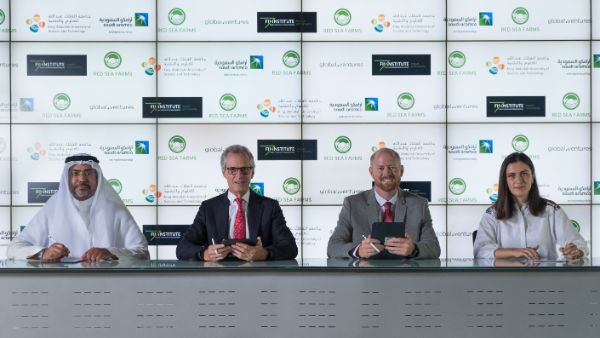Leading Saudi and UAE investors provide $10m venture capital for Saudi startup to expand salt-water farms
- June 9, 2021
- Posted by: Elaine Coles
- Category: Agriculture, Companies, Investment and Finance, Technology & Innovation, Middle East

Red Sea Farms, a Saudi Arabian AgTech business whose one-of-a-kind technology enables the commercial farming of produce using primarily salt water, has received a $10 million venture capital investment today from a group of leading Saudi and UAE investors.
The investment in Red Sea Farms, which is based at King Abdullah University for Science & Technology (KAUST) 60 miles north of Jeddah, is one of the region’s largest AgTech investments to date. The consortium reflects growing investor interest in the Gulf in sustainable farming solutions that can combat pandemics and global supply chain disruptions.
The funding is being led by a group of Saudi and UAE investors including the Aramco entrepreneurship arm Wa’ed, the non-profit foundation Future Investment Initiative Institute, KAUST and Global Ventures, a UAE venture capital group. The funding is one of the first AgTech investment for many of the participants.
Red Sea Farms was established in 2018 with a vision to reduce food insecurity, carbon and fresh water use in the global and Gulf food sectors. The company’s unique, end-to-end growing system primarily uses salt water, cutting fresh-water consumption by 85 to 90 percent. Through a patented system of new, more efficient solar and growth monitoring technologies, salt water replaces fresh water typically used to cool greenhouses and irrigate crops.
Red Sea Farms’ growing systems can be quickly and easily scaled in climates such as the Middle East, where conventional farming methods are not possible or cost-effective. The company is initially using its technology to grow and sell tomatoes in Saudi Arabia, but ultimately plans to sell entire turn-key growing systems to buyers around the world.
Red Sea Farms plans to use the funding to build and retrofit more than six hectares of commercial farming operations in central and western Saudi Arabia. The company currently operates a salt-water pilot greenhouse at the KAUST Research & Technology Park.
“We are proud to have designed, developed and delivered one of the world’s most sustainable agricultural systems from our base in Saudi Arabia,” said Ryan Lefers, Red Sea’s Chief Executive, who along with professors Mark Tester, Chief Scientist and Derya Baran, Chief Engineer, co-founded Red Sea Farms. “The investment from our new partners will help us improve global food security while reducing the carbon and fresh-water footprint.”
Wassim Basrawi, the managing director of Aramco venture Wa’ed, commented:
“The Red Sea Farms investment reflects our decade-long commitment to the Saudi start-up sector, where Wa’ed has deployed more than $100 million in venture capital investments and loans to more than 100 entrepreneurs. Red Sea Farms is a good example of a game-changing start- up whose innovations not only can transform markets but improve life for everyone in the Kingdom.”
The investment is FII Institute’s first in the AgTech sector. Richard Attias, the FII Institute Chief Executive Officer, said:
“Our investment in Red Sea Farms is an expression of FII- Institute’s mission to support initiatives and projects which will have a positive impact on humanity. Our trilogy strategy ‘Think-Xchange-Act’ empowers us to play a transformative role in the new impact economy. We are pleased to partner with the King Abdullah University for Science and Technology and leading investors to bring this revolutionary technology to market.”
A KAUST spin-out advised by Kirchner Group, Red Sea Farms was originally founded by Tester, a plant scientist, and Lefers, an agricultural engineering expert. The pair recently acquired Iyris Advanced Desert Greenhouses, a maker of smart glass that integrates solar technologies and optical tuning developed by KAUST’s Baran, who became a co-founder.
Red Sea Farms received a $1.9 million investment in 2019 from the KAUST Innovation Fund and Research Product Development Company (RPDC); a subsidiary fully owned by the Saudi Technology Development and Investment Company (TAQNIA). A leading graduate research university, KAUST is a major innovator of sustainable agriculture solutions for the Middle East and other water-scarce regions.
